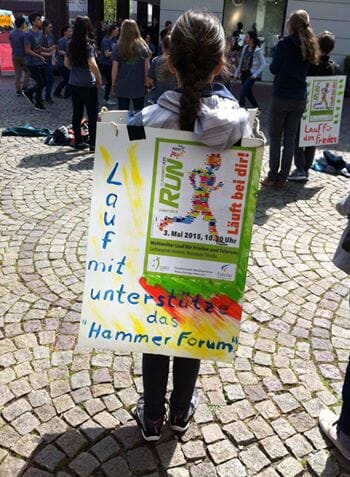
May 2, 2015 | Focolare Worldwide
https://www.youtube.com/watch?v=SNo_9JOXWzo One video from the Teens for Unity in Syria shows how they are keeping hope alive in their battered country. It will be viewed by their peers in other countries, who are equally committed to bearing witness with gestures of fraternity, towards the building of a peaceful present. Teenagers from Slovakia will head to Ukraine, just outside Mucachevo: “Even though the war is underway in another part of the country,” they write, “here you feel the great economic crisis and atmosphere of hopelessness.” A small group will go to Kiev in support of their Ukrainian friends. In Bethlehem, a city of peace, Christian and Muslim teenagers from Bethlehem, Nazareth and Haifa will run together. They will take off from Nativity Square: “We’ll announce to Mayor Vera Baboun and the people we find there, our commitment to living out the Golden Rule in order to build fraternity.” In Arequipa, Peru, 2,300 metres above sea level, a chain of solidarity will be unleashed. Each teenager will take foodstuffs and school materials to two centres – one for abandoned children and the other for children with disabilities.  The group from Wellington, New Zealand, will be the first to run; and Los Angeles, USA will close the event. In Malta, the race will be opened by the President of the Republic, M. Luise Coleiro Preca. Some symbolic sites along the race course include the Statue of Liberty on St Gellert Hill, in Budapest, Hungary. In Cochabamba, Bolivia, the teenagers will climb to the feet of the statue of Cristo de la Concordia where it is written: “That all may be one.” In Trelew, Argentina, a peace mural in the centre of town; and in Houston, Texas, a food collection for refugees. All the activities in the Southern Cone and Brazil promise to be colourful and have a strong social imprint. In Kaunas, Lithuania, and in Hamm, Germany, there will be interreligious events. Sponsored by Mayor Thomas Hunsteger-Petermann, the Run4Unity in Hamm will include a “Reli Rally” that will link several places of worship around the city, including a mosque and a Hindu temple. The Bahai teenagers will grab crowd’s attention with a flash mob. Together, they intend to raise contributions for a local social project that helps children from war-torn countries (www.hammer-forum.de). In Goma, Congo, Christians from different Churches and Muslim teenagers from around the city will take part. All the events will be linked by a moment of prayer for peace, the “Time-Out,” offered every day at the noon hour of the different time zones. The teenagers will join together in prayer for all teenagers who live in situations of suffering, the victims of the recent earthquake in Nepal, the teens living in war zones, and those who have had to flee their homelands. Run4Unity will also be racing through the social media. With the hashtag #run4unity, all the links of peace and unity that are being built or rebuilt, can be shared with photos and videos that will be placed on the event’s website: http://www.run4unity.net/2015/. Run4Unity will take place during United World Week 2015. This year’s title is: “Discovering fraternity” as a way to promote peace at all levels of society. This year’s main event will be held in India.
The group from Wellington, New Zealand, will be the first to run; and Los Angeles, USA will close the event. In Malta, the race will be opened by the President of the Republic, M. Luise Coleiro Preca. Some symbolic sites along the race course include the Statue of Liberty on St Gellert Hill, in Budapest, Hungary. In Cochabamba, Bolivia, the teenagers will climb to the feet of the statue of Cristo de la Concordia where it is written: “That all may be one.” In Trelew, Argentina, a peace mural in the centre of town; and in Houston, Texas, a food collection for refugees. All the activities in the Southern Cone and Brazil promise to be colourful and have a strong social imprint. In Kaunas, Lithuania, and in Hamm, Germany, there will be interreligious events. Sponsored by Mayor Thomas Hunsteger-Petermann, the Run4Unity in Hamm will include a “Reli Rally” that will link several places of worship around the city, including a mosque and a Hindu temple. The Bahai teenagers will grab crowd’s attention with a flash mob. Together, they intend to raise contributions for a local social project that helps children from war-torn countries (www.hammer-forum.de). In Goma, Congo, Christians from different Churches and Muslim teenagers from around the city will take part. All the events will be linked by a moment of prayer for peace, the “Time-Out,” offered every day at the noon hour of the different time zones. The teenagers will join together in prayer for all teenagers who live in situations of suffering, the victims of the recent earthquake in Nepal, the teens living in war zones, and those who have had to flee their homelands. Run4Unity will also be racing through the social media. With the hashtag #run4unity, all the links of peace and unity that are being built or rebuilt, can be shared with photos and videos that will be placed on the event’s website: http://www.run4unity.net/2015/. Run4Unity will take place during United World Week 2015. This year’s title is: “Discovering fraternity” as a way to promote peace at all levels of society. This year’s main event will be held in India.
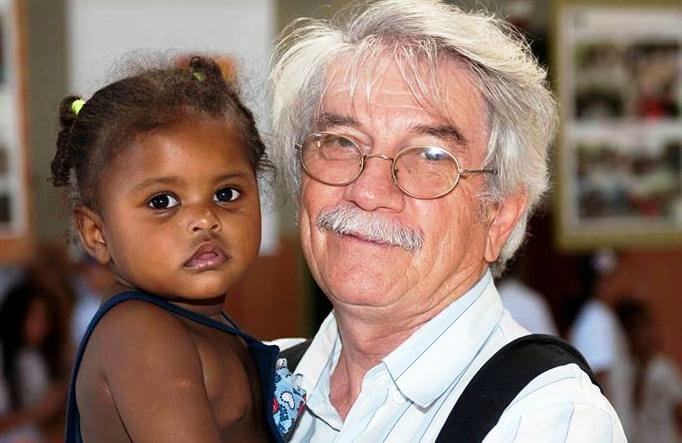
May 2, 2015 | Focolare Worldwide
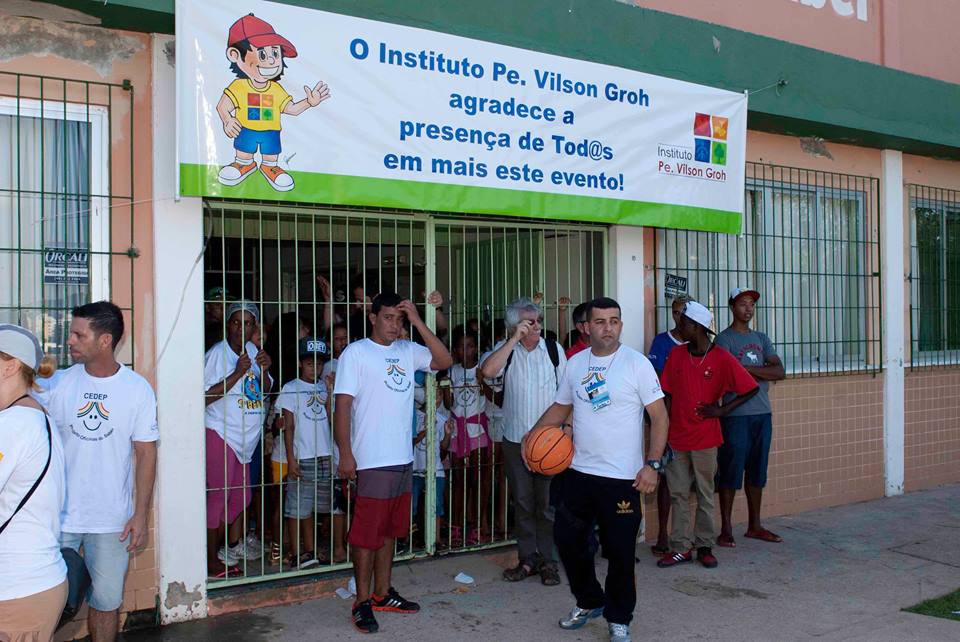 With a network of organisations and a generous and concrete presence, “Fr Vilson” promotes the life and dignity of the most excluded. We asked him the significance of the Eucharist, as the source of unity, for his work in the peripheries. We offer a few excerpts of what he said. “The other day I was with a person who was living on the street, a journalist and a poet. During the course of our conversation he asked me: “What are you doing here on the streets with us?” I answered him that it had seemed a great contradiction to me that I celebrated the Mass in the cathedral every Sunday, and when I stepped out of the church building I would meet seventy to eighty people who didn’t have a roof over their heads, and they hadn’t eaten. How could I go home?
With a network of organisations and a generous and concrete presence, “Fr Vilson” promotes the life and dignity of the most excluded. We asked him the significance of the Eucharist, as the source of unity, for his work in the peripheries. We offer a few excerpts of what he said. “The other day I was with a person who was living on the street, a journalist and a poet. During the course of our conversation he asked me: “What are you doing here on the streets with us?” I answered him that it had seemed a great contradiction to me that I celebrated the Mass in the cathedral every Sunday, and when I stepped out of the church building I would meet seventy to eighty people who didn’t have a roof over their heads, and they hadn’t eaten. How could I go home? 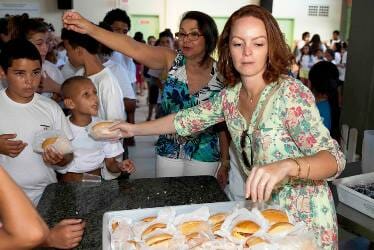 My house stands on the hills of Florianópolis where the number of very poor houses is growing. My house is simple and doesn’t have a key. People come throughout the day to have a cup of coffee or eat something. We’re always adding another plate at table. That door that is always opened means to say that I am open to the neighbourhood community. There is always a place for anyone who knocks at the door. And this is a way to remember that the Eucharist “never closes,” never. He is “at our disposal” twenty four hours a day. In practical terms it means that our refrigerator has to be the refrigerator of the people; our bread, their bread; our clothes, the clothing of the poor. I have been blessed to have the tabernacle in a small chapel in my house. Going home at the end of each day means going to rest where Jesus is waiting for me in the Eucharist, and to rest my head on Him, rather than running to the t.v. or internet that can lead us to many other places.
My house stands on the hills of Florianópolis where the number of very poor houses is growing. My house is simple and doesn’t have a key. People come throughout the day to have a cup of coffee or eat something. We’re always adding another plate at table. That door that is always opened means to say that I am open to the neighbourhood community. There is always a place for anyone who knocks at the door. And this is a way to remember that the Eucharist “never closes,” never. He is “at our disposal” twenty four hours a day. In practical terms it means that our refrigerator has to be the refrigerator of the people; our bread, their bread; our clothes, the clothing of the poor. I have been blessed to have the tabernacle in a small chapel in my house. Going home at the end of each day means going to rest where Jesus is waiting for me in the Eucharist, and to rest my head on Him, rather than running to the t.v. or internet that can lead us to many other places.  There is a sentence engraved on the paten I use for Mass. It’s the Gospel sentence from my Ordination: “I was hungry and you fed me, thirsty and you gave me to drink,” all the way to the end of the text: “Whatever you did to the least of my brothers, you did it to me.” So, every time I place the Eucharistic Bread on the paten, I see those words and they help me not to waste the day. One day a lady from the neighbourhood asked me: “Father Vilson, do you know why Jesus wanted to remain in the Eucharist? So the people wouldn’t feel the solitude and be orphans.” The Eucharist is the great human cry. “There cannot be any gap between the Table of the Eucharist on one side and the table of social justice on the other. It is with our gestures, our arms, our ways of organising that we extend the reality of Jesus in the Eucharist, and we give the world a signal of sharing and support. Guided by this conviction, with the passing of years and along with many other people, we set up a network of 340 people who receive a monthly salary; 7 organisations and one institute. 5000 boys and girls, teenagers and young people gravitate to our network of relationships each day. In order to help build bridges we decided to open an unused church right in the heart of the city, and this gave rise to a large local community with intellectuals, middle class people and business owners who are involved in our activities in a variety of ways. We celebrate Mass there every Saturday and Sunday, and, in this way we believe we create a point of encounter between periphery and center.
There is a sentence engraved on the paten I use for Mass. It’s the Gospel sentence from my Ordination: “I was hungry and you fed me, thirsty and you gave me to drink,” all the way to the end of the text: “Whatever you did to the least of my brothers, you did it to me.” So, every time I place the Eucharistic Bread on the paten, I see those words and they help me not to waste the day. One day a lady from the neighbourhood asked me: “Father Vilson, do you know why Jesus wanted to remain in the Eucharist? So the people wouldn’t feel the solitude and be orphans.” The Eucharist is the great human cry. “There cannot be any gap between the Table of the Eucharist on one side and the table of social justice on the other. It is with our gestures, our arms, our ways of organising that we extend the reality of Jesus in the Eucharist, and we give the world a signal of sharing and support. Guided by this conviction, with the passing of years and along with many other people, we set up a network of 340 people who receive a monthly salary; 7 organisations and one institute. 5000 boys and girls, teenagers and young people gravitate to our network of relationships each day. In order to help build bridges we decided to open an unused church right in the heart of the city, and this gave rise to a large local community with intellectuals, middle class people and business owners who are involved in our activities in a variety of ways. We celebrate Mass there every Saturday and Sunday, and, in this way we believe we create a point of encounter between periphery and center.
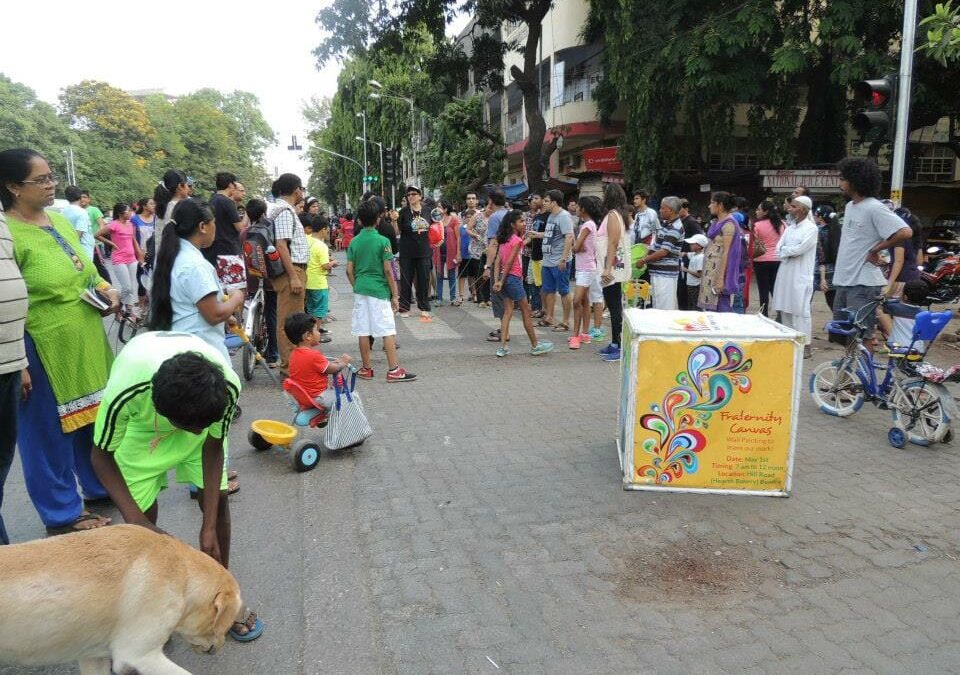
May 1, 2015 | Focolare Worldwide
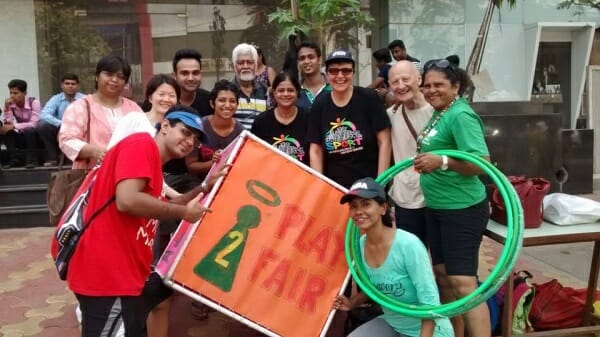 More than 120 young representatives from 25 countries: from Japan to Italy, from Korea to Colombia, from Nepal to Romania, take part in an annual event that takes place within the framework of United World Week which is celebrated around the world and gives a witness that cultural and religious differences are not an obstacle between peoples but a springboard for a more united and fraternal world. This year’s title: “Fabric, Flavour, Festival – discovering fraternity,” focuses on 360° dialogue. Fabric. Face the challenges of dialogue in order to build a more United World: discovering one’s own identity; accepting and respecting others; and having the courage to take the first step. Festival: discovering one another as brothers and sisters. Flavour. Dialogue in action: living the Goldenn Rule, “Do to others what you would have them do to you;” opening the way to reciprocity and sharing. Multiculturalism was the leitmotif of the days in Mumbai. Representatives from the Shanti Ashram (Hindu Movement) and the Rissho Kosei-Kai (Buddhist Movement) joined with young Christians to share moments of brotherhood and service towards Indian young people and civil community.
More than 120 young representatives from 25 countries: from Japan to Italy, from Korea to Colombia, from Nepal to Romania, take part in an annual event that takes place within the framework of United World Week which is celebrated around the world and gives a witness that cultural and religious differences are not an obstacle between peoples but a springboard for a more united and fraternal world. This year’s title: “Fabric, Flavour, Festival – discovering fraternity,” focuses on 360° dialogue. Fabric. Face the challenges of dialogue in order to build a more United World: discovering one’s own identity; accepting and respecting others; and having the courage to take the first step. Festival: discovering one another as brothers and sisters. Flavour. Dialogue in action: living the Goldenn Rule, “Do to others what you would have them do to you;” opening the way to reciprocity and sharing. Multiculturalism was the leitmotif of the days in Mumbai. Representatives from the Shanti Ashram (Hindu Movement) and the Rissho Kosei-Kai (Buddhist Movement) joined with young Christians to share moments of brotherhood and service towards Indian young people and civil community. 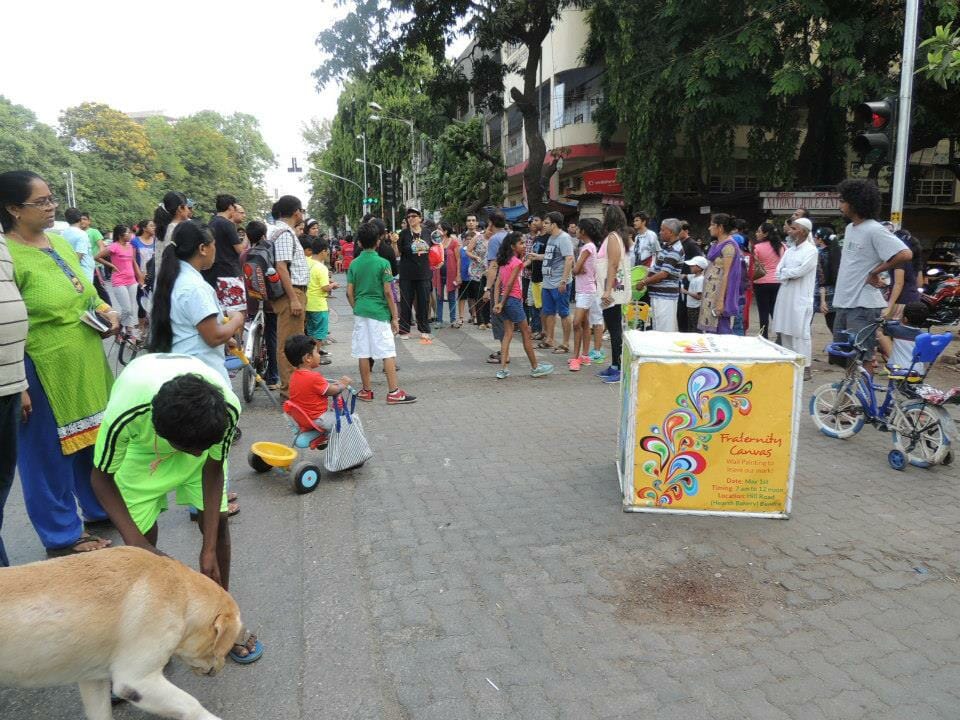 Lawrence from Religions for Peace says that he is here because “we need to show positive things to the world. We need to show the world that fraternity can change history.” Crisfan, a young Hindu, says that he met the Young People for a United World a few years ago: “ever since then, I have wanted to build bridges of fraternity. Religion is never an obstacle in India. Each person follows a path, but we’re all brothers and sisters.” He married a few months ago and also involved his wife in the adventure. The days were busy and intense, sharing in tragic events like that of Nepal where the earthquake produced thousands of victims. Sana and Roshan are also here in Mubmai; they have not been able to contact their families, but seem serene: “we’re sure that God is taking care of them.” Meanwhile, everybody prays. At day’s end we receive some nice news: their family are fine. They fled, but God’s love didn’t force them to wait. Maria Chiara, an Italian, tells us how she had long been hoping for such an experience. “When Christian invited me, I felt like I couldn’t let this opportunity slip by. I’m here to know other young people and to learn to live the other person’s culture as my own.” Christian is Romanian and studies at Sophia University Institute in Italy. After visiting the Holy Land (2013) and Kenya (2014), this year I decided to close my books “and find out how fraternity is lived in a different culture than my own.” Concrete brotherhood is already a living experience at this international site in India, as all sorts of activities in favour of peace are being held in many other parts of the world.
Lawrence from Religions for Peace says that he is here because “we need to show positive things to the world. We need to show the world that fraternity can change history.” Crisfan, a young Hindu, says that he met the Young People for a United World a few years ago: “ever since then, I have wanted to build bridges of fraternity. Religion is never an obstacle in India. Each person follows a path, but we’re all brothers and sisters.” He married a few months ago and also involved his wife in the adventure. The days were busy and intense, sharing in tragic events like that of Nepal where the earthquake produced thousands of victims. Sana and Roshan are also here in Mubmai; they have not been able to contact their families, but seem serene: “we’re sure that God is taking care of them.” Meanwhile, everybody prays. At day’s end we receive some nice news: their family are fine. They fled, but God’s love didn’t force them to wait. Maria Chiara, an Italian, tells us how she had long been hoping for such an experience. “When Christian invited me, I felt like I couldn’t let this opportunity slip by. I’m here to know other young people and to learn to live the other person’s culture as my own.” Christian is Romanian and studies at Sophia University Institute in Italy. After visiting the Holy Land (2013) and Kenya (2014), this year I decided to close my books “and find out how fraternity is lived in a different culture than my own.” Concrete brotherhood is already a living experience at this international site in India, as all sorts of activities in favour of peace are being held in many other parts of the world.
![PRESET Eco-sustainability Project in Argentina]()
Apr 28, 2015 | Focolare Worldwide
 Forty-two professionals of eight different countries in Europe and Latin America accepted the invitation. The event which was held in the Focolare’s Lia town at the outskirts of Buenos Aires, not only hosted the seminar (9-21 March) financed by the European Union, but was also subjected to the study for the creation of a sustainable management and development model of a sustainable place to live in. To coincide with these times when we feel the urgency of questioning ourselves on the environment and promoting the quest for new technologies – with the planet’s survival at stake – the initiative was joined by the group, “Dialogue in Architecture,” a network of scholars and experts of the sector, inspired by the spirituality of the Focolare, given the actuality of the theme.
Forty-two professionals of eight different countries in Europe and Latin America accepted the invitation. The event which was held in the Focolare’s Lia town at the outskirts of Buenos Aires, not only hosted the seminar (9-21 March) financed by the European Union, but was also subjected to the study for the creation of a sustainable management and development model of a sustainable place to live in. To coincide with these times when we feel the urgency of questioning ourselves on the environment and promoting the quest for new technologies – with the planet’s survival at stake – the initiative was joined by the group, “Dialogue in Architecture,” a network of scholars and experts of the sector, inspired by the spirituality of the Focolare, given the actuality of the theme.
By immersing themselves in the discovery of the territory and its structures, the youth started by studying the PRESET (“Participation, Resilience and Employability through Sustainability, Entrepreneurship and Training”), a study project promoted by the association Starkmacher – on the sustainability of the towns of the Focolare – and other partners such as the Fazenda da Esperança (Brazil), Fundación Unisol (Bolivia), New Humanity ((an NGO with Special Consultative Status within the Economic & Social Council of the United Nations) and Economy for tomorrow (Slovenia), and to work specifically on an integral eco-sustainable proposal for the town of Lia.
The youth participated in five thematic workshops guided by the value of fraternity as a lifestyle, and reached an integral eco-sustainable proposal (Ecocity Mariapolis) in which they involved all the inhabitants of the town, and also the youth of the district who attended for an afternoon to recount and speak of the environment.
 The EcoCity Mariapolis that will implement the proposal while respecting the history of the town and carrying out concrete dialogues with its inhabitants, created during the seminar, a biogas system for one of the houses of the town, and explained the procedure to make compost, a study for the installation of a photovoltaic system, for the insulation of the constructions in order to save energy and for the replacement of bulbs with Led lights and many more. This seemed to be a step by step growth in the education on the environment. A set of didactic handouts will be prepared for the inhabitants and the visitors of the Mariapolis, to be diffused also in schools through the Web.
The EcoCity Mariapolis that will implement the proposal while respecting the history of the town and carrying out concrete dialogues with its inhabitants, created during the seminar, a biogas system for one of the houses of the town, and explained the procedure to make compost, a study for the installation of a photovoltaic system, for the insulation of the constructions in order to save energy and for the replacement of bulbs with Led lights and many more. This seemed to be a step by step growth in the education on the environment. A set of didactic handouts will be prepared for the inhabitants and the visitors of the Mariapolis, to be diffused also in schools through the Web.
Also art was utilised for the efficacy of the proposal through the creation of a line of products (hair, hats, etc.) decorated with ethnic motifs and produced with ecologic material, and with a theatre performance connected to the theme.
A pleasant coincidence in those days was that the Dean of Sophia University Institute of Loppiano, Prof. Piero Coda, happened to be visiting the town and said: «I think this is not just a coincidence. Perhaps it is God’s design that is leading to something new, and creating a network of communion, work for solidarity and justice.»
Francesco from Udine gave a significant testimonial: «I work as an architect and am doing a Master’s in almost zero energy buildings. What I found most interesting in this workshop is the fact that people with diverse potentials and specializations are working together, and not only architects like us. I think this is the most enriching part for everyone: starting off with different potentials to reach a common objective which is that of sustainability, not only from the environmental but also from the economic and social points of view.»
Likewise Riccardo, an Italian architect, is convinced of the importance of working together: «I firmly believe that what I can do is but a small part, while together we could reach the objectives that will allow the entire society to exploit the resources well, and create satisfactory wellbeing for everyone including professionals. »
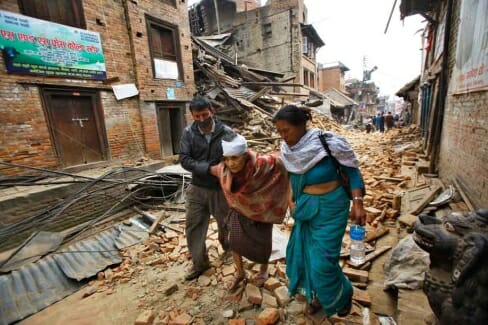
Apr 27, 2015 | Focolare Worldwide
 Some of our Nepalese friends wrote:«The situation is really bad. I myself am alive, but we have lived without a roof above our heads for days and nights. Many have died and others are dying, and many are wounded. Besides the rising number of victims according to the UNICEF estimates, 940 thousand children are at risk, and urgently need healthcare. The Focolare Movement joins the prayers for the people struck, their families, in their requests for consolation in this immense tragedy, and is making the move to gather funds. From Mumbai, where the youth of the Focolare have gathered to prepare for the United World Week – and among which there are three from Nepal – the group has launched an appeal to the Youth for a United World worldwide, to start up a support action for all the people struck by the calamity: «The United World Week – they wrote – may be an immediate occasion to concretely express our support.» Pope Francis, after praying during the Angelus for the victims of the earthquake, urging all to “give their fraternal support,” expressed in a message sent to the Apostolic Nunzio in Nepal, his own personal prayer and support for the Nepalese population. Caritas Nepal, in the meantime, has started up an action plan to face the emergency, but it needs a lot of backup. Tents and food are being distributed: the main problem at the moment is to offer a refuge, to protect the people from the cold and the rain.
Some of our Nepalese friends wrote:«The situation is really bad. I myself am alive, but we have lived without a roof above our heads for days and nights. Many have died and others are dying, and many are wounded. Besides the rising number of victims according to the UNICEF estimates, 940 thousand children are at risk, and urgently need healthcare. The Focolare Movement joins the prayers for the people struck, their families, in their requests for consolation in this immense tragedy, and is making the move to gather funds. From Mumbai, where the youth of the Focolare have gathered to prepare for the United World Week – and among which there are three from Nepal – the group has launched an appeal to the Youth for a United World worldwide, to start up a support action for all the people struck by the calamity: «The United World Week – they wrote – may be an immediate occasion to concretely express our support.» Pope Francis, after praying during the Angelus for the victims of the earthquake, urging all to “give their fraternal support,” expressed in a message sent to the Apostolic Nunzio in Nepal, his own personal prayer and support for the Nepalese population. Caritas Nepal, in the meantime, has started up an action plan to face the emergency, but it needs a lot of backup. Tents and food are being distributed: the main problem at the moment is to offer a refuge, to protect the people from the cold and the rain.
Funds can be deposited directly in the Youth for a United World special bank account: SAVINGS ACCOUNT OF THE CENTRAL SECRETARIAT OF THE YOUTH FOR A UNITED WORLD (GMU) Description: EMERGENCY NEPAL ACCOUNT NAME: PIA ASSOCIAZIONE MASCHILE OPERA DI MARIA Via Frascati 306, Rocca di Papa, 00040 Rome, Italy BANK NAME: BANCA PROSSIMA Piazza Paolo Ferrari 10 20121 Milan Italy IBAN CODE FOR NATIONAL AND INTERNATIONAL TRANSFERS: IBAN IT62 W033 5901 6001 0000 0113 348 BIC BCITITMX
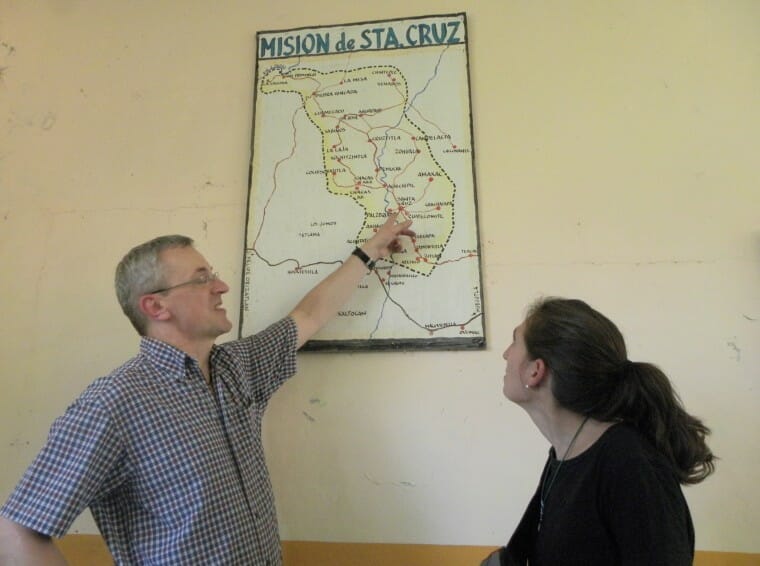
Apr 27, 2015 | Focolare Worldwide
 First time visitors to Santa Cruz de la Sierra are met by an unexpected scene: the exuberant and inviting natural environment, an unfamiliar language, the quite diverse local culture, the poverty, simplicity and endless generosity of the people.
First time visitors to Santa Cruz de la Sierra are met by an unexpected scene: the exuberant and inviting natural environment, an unfamiliar language, the quite diverse local culture, the poverty, simplicity and endless generosity of the people.
One group of young people and families from the Focolare decided to spend Holy Week in Santa Cruz with their friends from the Nahua. Due to the great pastoral need, the local Church gave permission to certain prepared laypeople to act as extraordinary ministers at the discretion of the pastors. They share what happened:
“The sun has just appeared over the horizon and the bus clambers along the mountain roads of east Sierra Madre, carrying 43 young people and families from the Focolare. The journey promises to be long and exciting; the tiredness goes unnoticed because of the great joy. At the road’s end there are brothers and sisters from 33 families of the Nahuas community ready to celebrate Holy Week with us.
Eight hours away from the City of Mexico we are welcomed into Santa Cruz by a generous and humble folk living in the heart of the huasteca hidalgeuense (unfading flower): a humid region with high temperatures, covered with cedar, ebony and mahogany wood trees.
At one of the mission parishes we split up into seven groups and go out to be with the people, to help with the liturgical services in seven communities where the seed of the spirituality of the Focolare has been growing for several years.
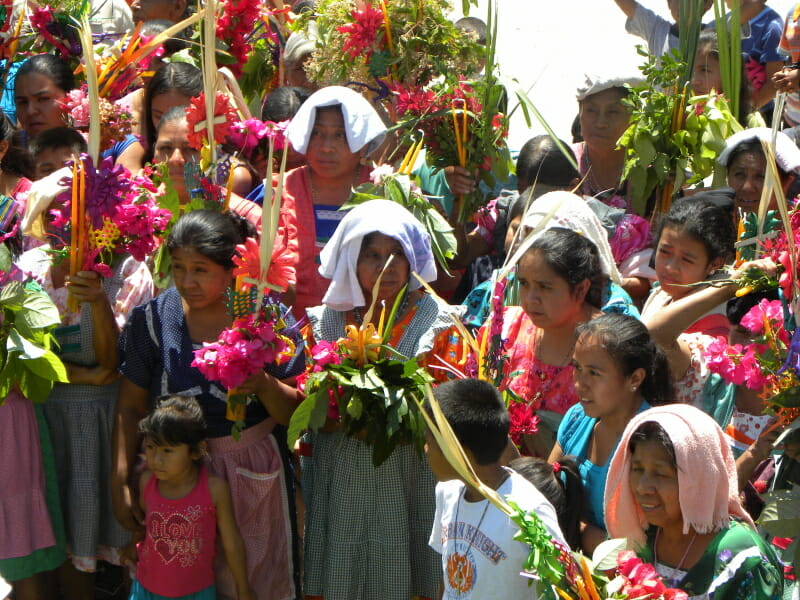 The encounter is overwhelming as the life, faith and bread begin to be shared. Several testimonies of Gospel life are shared, as well as small gift items. After the celebration of the washing of the feet, one of the young people exclaims: “It’s so fantastic to feel like a Christian!” One teenager said she had attended many missions, but “with Jesus among us it’s different; indeed, He’s the one who draws people and that’s why we wanted to attend the meetings and the liturgical celebrations.”
The encounter is overwhelming as the life, faith and bread begin to be shared. Several testimonies of Gospel life are shared, as well as small gift items. After the celebration of the washing of the feet, one of the young people exclaims: “It’s so fantastic to feel like a Christian!” One teenager said she had attended many missions, but “with Jesus among us it’s different; indeed, He’s the one who draws people and that’s why we wanted to attend the meetings and the liturgical celebrations.”
Amongst the many personal encounters, one particularly touched us: We visit an alone and elderly man, who has been immobile for a long time. The state of his hygiene is extremely poor. We bathe him and clean his tiny room; help him to prepare for receiving Jesus in the Eucharist, and give him Holy Communion. The next day, he dies.
Following a Holy Week of intense living and after having experienced mutual giving and receiving in simplicity and generosity, the moment arrives when we must return to Mexico City. During the return trip, many of us remember the words spoken by Chiara Lubich in the Basilica of Guadalupe in 1997: “Inculturation requires an exchange of gifts.”
Seeing the enthusiasm of the young misioneros and the members of the communities we visited, there is new hope that the Misión in Santa Cruz will not remain an isolated event, but the sign of a new beginning of a process of increased giving by the Focolare in Mexico.”

 The group from Wellington, New Zealand, will be the first to run; and Los Angeles, USA will close the event. In Malta, the race will be opened by the President of the Republic, M. Luise Coleiro Preca. Some symbolic sites along the race course include the Statue of Liberty on St Gellert Hill, in Budapest, Hungary. In Cochabamba, Bolivia, the teenagers will climb to the feet of the statue of Cristo de la Concordia where it is written: “That all may be one.” In Trelew, Argentina, a peace mural in the centre of town; and in Houston, Texas, a food collection for refugees. All the activities in the Southern Cone and Brazil promise to be colourful and have a strong social imprint. In Kaunas, Lithuania, and in Hamm, Germany, there will be interreligious events. Sponsored by Mayor Thomas Hunsteger-Petermann, the Run4Unity in Hamm will include a “Reli Rally” that will link several places of worship around the city, including a mosque and a Hindu temple. The Bahai teenagers will grab crowd’s attention with a flash mob. Together, they intend to raise contributions for a local social project that helps children from war-torn countries (www.hammer-forum.de). In Goma, Congo, Christians from different Churches and Muslim teenagers from around the city will take part. All the events will be linked by a moment of prayer for peace, the “Time-Out,” offered every day at the noon hour of the different time zones. The teenagers will join together in prayer for all teenagers who live in situations of suffering, the victims of the recent earthquake in Nepal, the teens living in war zones, and those who have had to flee their homelands. Run4Unity will also be racing through the social media. With the hashtag #run4unity, all the links of peace and unity that are being built or rebuilt, can be shared with photos and videos that will be placed on the event’s website: http://www.run4unity.net/2015/. Run4Unity will take place during United World Week 2015. This year’s title is: “Discovering fraternity” as a way to promote peace at all levels of society. This year’s main event will be held in India.
The group from Wellington, New Zealand, will be the first to run; and Los Angeles, USA will close the event. In Malta, the race will be opened by the President of the Republic, M. Luise Coleiro Preca. Some symbolic sites along the race course include the Statue of Liberty on St Gellert Hill, in Budapest, Hungary. In Cochabamba, Bolivia, the teenagers will climb to the feet of the statue of Cristo de la Concordia where it is written: “That all may be one.” In Trelew, Argentina, a peace mural in the centre of town; and in Houston, Texas, a food collection for refugees. All the activities in the Southern Cone and Brazil promise to be colourful and have a strong social imprint. In Kaunas, Lithuania, and in Hamm, Germany, there will be interreligious events. Sponsored by Mayor Thomas Hunsteger-Petermann, the Run4Unity in Hamm will include a “Reli Rally” that will link several places of worship around the city, including a mosque and a Hindu temple. The Bahai teenagers will grab crowd’s attention with a flash mob. Together, they intend to raise contributions for a local social project that helps children from war-torn countries (www.hammer-forum.de). In Goma, Congo, Christians from different Churches and Muslim teenagers from around the city will take part. All the events will be linked by a moment of prayer for peace, the “Time-Out,” offered every day at the noon hour of the different time zones. The teenagers will join together in prayer for all teenagers who live in situations of suffering, the victims of the recent earthquake in Nepal, the teens living in war zones, and those who have had to flee their homelands. Run4Unity will also be racing through the social media. With the hashtag #run4unity, all the links of peace and unity that are being built or rebuilt, can be shared with photos and videos that will be placed on the event’s website: http://www.run4unity.net/2015/. Run4Unity will take place during United World Week 2015. This year’s title is: “Discovering fraternity” as a way to promote peace at all levels of society. This year’s main event will be held in India. 










